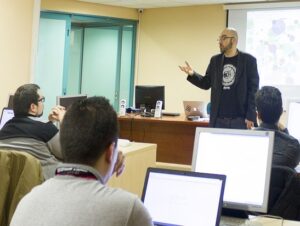The Apprenticeship Levy: Preparing for the known unknowns
- 8 Min Read
The apprenticeship levy could trigger an organisation-wide reassessment of recruitment and talent development. Employers who start preparing now can get the most out of it and bring the business together
- Author: Owain Thomas
- Date published: May 26, 2016
- Categories

The apprenticeship levy could trigger an organisation-wide reassessment of recruitment and talent development. Employers who start preparing now can get the most out of it and bring the business together
The incoming Apprenticeship Levy is set to shake-up the way large employers recruit and train their workforce.
Unveiled in last year’s Summer Budget to boost opportunities for younger people getting into employment, it applies to the largest employers with a payroll bill of over £3m.
Some of the headline details have already been released, but there is still much that employers are waiting to hear about.
Understandably, many are concerned and more than a little wary about where their levy funding will go, and whether they will be able to make the most out of it.
But there is more to it than just getting return on investment. If considered strategically and across the whole organisation, it could result in substantial improvements to the recruitment and skills development of the whole workforce.
Chartered Institute for Personnel and Development (CIPD) chief executive Peter Cheese told HRD Connect that he felt the jury was still out on whether it was going to make a difference or be the right approach.
“The great danger which is so true in so many policy things is it’s a crude instrument of change and there’s a lot of unintended consequences,” he said.
Major concerns
Two of the major concerns centre on big companies dominating the supply chain to get their entire levy fee back, and the dumbing-down or re-badging of inappropriate courses.
“The big companies that have got all the resources are going to say well if I’ve got to pay all this apprenticeship levy then I’m going to go to my HRD and say get it back for me,” Cheese continued.
“Second there are lots of signs already of rebadging things – not subsequently moving the dial at all but just rebadging what we’re already doing, and even worse, potentially rebadging things which shouldn’t be called apprenticeships.
“These are things which employers should be doing anyway. Basic manager development programmes is a common one – well shouldn’t you be doing that one anyway? Why do you need funding for that? Why would you necessarily call that an apprenticeship?” he added.
However, it’s not all bad news for Cheese.
He believes it is a positive sign that the government is at least looking at taking apprenticeships more seriously and that a wider range of businesses will now be using them.
“We are seeing a lot more businesses of every kind from professional services through to more traditional ones like engineering talking much more about apprenticeships as a good model,” Cheese added.
Under-employed staff feel increasingly trapped with sporadic training
 Eligible employees
Eligible employees
But the unknown elements are still many and varied and will have a significant impact on how employers can utilise their levy payments.
One of the big questions still to be decided by government is which employees will be eligible for apprenticeships supported by the levy.
Will those staff who already have degrees or other higher level qualification be able to use it to re-train in another sector? At present it appears those who completed their first year of a degree or more will be excluded.
Related to this, when apprenticeships are conducted they are usually done so at the next stage up from the person’s current level of education.
This, of course, could be problematic and highly unnecessary for someone who may have completed a further education course (or higher) in one subject many years ago, but now needs to retrain at a more basic level to enter a new industry or job role.
Speaking at the Arch Apprentices webinar on the subject, BC Accelerate managing director Ben Rowland also raised concerns about the government technology that will operate the service.
“The big unknown is whether the Digital Apprenticeship Service is going to be up and running in time,” he said.
“Those in the tech sector know government deadlines and IT projects don’t always go together the way politicians imagine when they launch these things. However, we’ve been reasonably impressed that the team have pared back the scope and have focused very clearly on making sure it’s the voucher system that works and the bells and whistles to be added subsequently.”
Paying the way
Another key concern is the amount of levy that can be used for different kinds of apprenticeships.
“Clearly organisations can spend as much as they want on apprenticeships, but the government is only going to allow a certain amount of levy to be spent on a given apprenticeship,” Rowland continued.
“We’re expecting it to be different rates for an accountancy or HR apprenticeship than a technology apprenticeship, so we’re waiting to hear next month what the initial indications of that may be.”
But he reiterated the key message that should be borne in mind when considering what to do with apprenticeships: “This isn’t just about rules, this is about amazing young talent being brought into the business.”
The availability of compatible apprenticeship standards may be one of the biggest concerns for employers at present.
These can take time to develop, needing co-ordination between employer groups, training and assessment providers and sign-off from the Department for Business, Innovation and Skills (BIS).
While representative groups are coming together to speed this process up, some preliminary standards have been declared ready for almost two years by BIS, yet are still awaiting completed final assessments to approved.
Shared parental leave and higher qualifications to drive polarised labour market changes
Plan now
As a result of this and many other technical and compliance nuances, Rowland urged employers to begin considering early if and how they will use the apprenticeship system.
“It’s important to get full buy-in from the organisation because it’s not just the levy, it’s the apprentices who are being trained through the levy, and line management is other investment required as well,” he said.
“Our strong recommendation is to get going now. If you think there are programmes you would like to do under the levy but you have never invested in apprenticeships before, then get going now while the government subsidy is still as substantial as it is. Start small pilots in different areas of the business in order that you get some first-hand experience in your organisation.
“If you wait until April to take in your first apprentices then it’s going to be a pretty high stakes moment when those first apprentices arrive. Starting now you’ll learn lots of lessons, but at least it won’t be your levy paying to learn that,” he added.
One of the key items on the to do list should be to discover what skills gaps the organisation currently has and what ones it is likely going to need to fill in the next few years.
By understanding this path HR teams can coordinate plans with the rest of the business and then identify where there may be a need for apprenticeships involving standards that do not already exist.
These can then be developed within good time to meet the organisation’s need.
Planning further ahead like this can also be useful in deciding how to use a levy payments made, as all contributions are retained by the government and distributed to other projects 18 months after being made.
 Filling the skills gap
Filling the skills gap
While it appears the government may be listening to concerns voiced by employers groups and trade unions, it appears there is no turning back.
As the CIPD’s Cheese noted, this may not be a bad thing to force employers to consider their role in the nation’s skills’ gap.
“We as business people have got to get more coherent in our ways of thinking because it’s very easy to point at government and the education system and say why have you got such a big skills mis-match? But is that the fault of education or is it equally the fault of business?” he said.
“Business has not been articulate enough about how we use the skills that are available to design jobs in organisations accordingly. How do we recognise that we have a very big responsibility in business about keeping skills current, developing skills in the workplace and that lifelong learning journey?”
So Cheese believes this project, while still possessing many inherent risks and needing coordination from several government agencies, can be a power for change of the right kind.
“It is about part of education and part of work coming closer together and getting much more coherent with work as to what kind of skills we need. What have we got available? What is the future workforce going to look like? That is not something as business people we’ve been very coherent about and we need to be, and now is the time because there’s so much change going on,” he concluded.
How Penguin Random House turned its recruitment process over to social media









